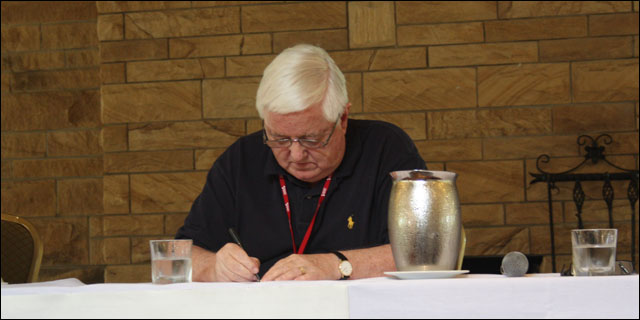Exetel shuns 'pointless' Interpol filter

Exetel has joined ranks with Internode and TPG with respect to the limited filtering scheme being rolled out by Telstra and Optus.

Exetel CEO John Linton
(Credit: Delimiter)
The internet service provider's chief executive, John Linton, today stated it would not implement the scheme unless required to do so by law, and described the industry association backing the project as "a bunch of wankers with nothing better to do with their time than pointlessly pontificate".
Telstra and Optus have pledged to implement a voluntary filtering framework developed by the ISP industry's peak representative body, the Internet Industry Association. The filter, which is being seen as a more moderate industry approach developed in reaction to the Federal Government's much more comprehensive filter scheme, will see the ISPs block a "worst of the worst" list of child pornography sites generated by international police agency Interpol.
However, a number of other ISPs, such as Internode and TPG, have taken a strong stand against the project, stating they will only implement the scheme if the law requires them to do so. iiNet has said that it is looking into the matter.
Today, Linton said his company would do "whatever the law requires it to do". "As far as I know, subject to correction, Australian law not only does not require Exetel to ban any IP address without a federal warrant and should we do so would expose Exetel to action by people who might claim to be inconvenienced by such action(s)," he said.
Linton further said that if anyone — "certainly an organisation with the resources and clout of Interpol" — knew the IP address of sites hosting child pornography, then they would presumably be in "a far better position" to shut those sites down than a small Australian ISP like Exetel.
Those promulgating filter schemes in Australia have regularly highlighted the difficulty of shutting down sites hosting objectionable content when they are located in international jurisdictions without cooperation agreements with Australia, with commonly cited countries including those in the former Soviet bloc in Eastern Europe. However, Linton rejected this argument for filtering content in Australia.
"And yes I am aware of the whining about 'rogue countries' — such whimpers are made by people ignorant as to how the internet actually works — a 12-year-old could close down those sites (or any site) in a few minutes," he said.
It's not the first time Linton has opposed filtering initiatives. In November 2008, as the debate around the Federal Government's much wider mandatory internet filtering scheme was gaining full force, Linton wrote a harshly satirical article about the initiative, noting that his company had been invited to "the fourth Reich's official sub-site where we could find the details of how to participate in Herr Krudd's and Obersturmführer Conroy's scheme to purge the Fatherland of the filth emanating from the diseased brains of the untermenschen".
"...is that the sound of a heavy military truck screeching to a halt and the sound of jackboots on the drive?" Linton added.
Today, Linton also criticised the organisation promulgating the Interpol filtering scheme — the Internet Industry Association — which represents ISPs and other organisations with an interest in the development of the internet in Australia. The IIA stated last week that its filtering scheme would be implemented for between 80 and 90 per cent of Australians this year.